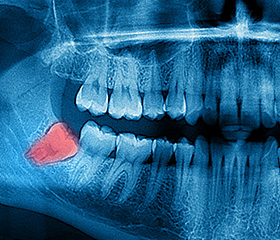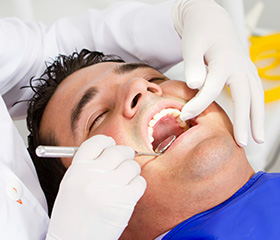Tooth Extractions – Port Orange, FL
Reliable & Comfortable Tooth Removal for Healthier Smiles
Your teeth are designed to last a lifetime with the right care, but there may come a time when you need to have a tooth extracted. At Water’s Edge Dental, Dr. Sean Bannan performs both simple and surgical tooth extractions in Port Orange. Although we try to prevent the need for the removal of a tooth, there are some instances where it is necessary to protect your oral health. Read on to learn more about extraction treatment or give us a call to schedule an initial consultation.
Why Choose Water’s Edge Dental for Tooth Extractions?
- Sedation Dentistry Available for Maximum Comfort
- Highly Trained & Experienced Dental Professional
- Offers Membership Plan & Flexible Financing
Reasons Why Tooth Extractions Are Necessary

Our team might recommend tooth extractions for several reasons, including:
- A severely damaged, decayed, or infected tooth that can’t be repaired
- Serious overcrowding of the teeth
- The need for extra space necessary for orthodontic treatment
- Making room for full dentures if there are still some natural teeth remaining
- Primary teeth that haven’t fallen out and risk the health of incoming adult teeth
- An impacted tooth that won’t come up from the gum line
Safe Tooth Extractions
Most often, teeth need to be extracted due to trauma, disease, or overcrowding. No matter what the cause is, you need a dentist who is specially trained in this procedure. Dr. Bannan and our dental team have the training and qualifications to safely perform simple and surgical tooth extractions.
Types of Tooth Extractions
There are various reasons why you might need to have one or more of your teeth extracted. Here’s a brief look at the various kinds of tooth removal procedures we can offer here at Water’s Edge Dental:
Simple Tooth Extractions

A simple tooth extraction is used when a tooth is visible above the gum line, such as the removal of a baby tooth or a tooth that has suffered damage. A local anesthetic is used to minimize discomfort. Then, the tooth is loosened and forceps are used to remove it.
Surgical Tooth Extractions

A surgical extraction is needed when a tooth cannot be seen above the gum line, such as impacted teeth or a tooth that has broken below the gum line. Since the tooth cannot be easily seen, the process to remove the tooth is a little more complex. In most cases, sedation is used to ensure your comfort during the procedure.
Wisdom Tooth Extractions

Wisdom teeth (also known as “third molars”) are the most common type of teeth that need to be extracted for the sake of the patient’s health and overall well-being. Since they are the last adult teeth to emerge, there usually isn’t enough room left for them in the mouth, resulting in them becoming partially or fully trapped within the jawbone. If they do emerge properly, wisdom teeth may cause dangerous overcrowding as well, and patients are likely to experience higher risks of infection. Dr. Bannan will be sure to keep a close eye on these developing areas of the mouth in young patients so that we can be well-prepared for signs of trouble and extract the teeth if necessary.
The Process of Removing a Tooth

Depending on the exact circumstances, the removal process will vary. For simple extractions, the tooth will be loosened and removed as a whole. However, if the tooth is severely impacted, it may be broken into pieces so that each piece can be removed safely. The area will be cleaned from debris and the extraction site will be closed with sutures. Our team will also likely provide sedation dentistry during any type of extraction to increase your level of relaxation and comfort throughout the procedure. You will also be given strict aftercare instructions to ensure the area heals correctly.
Tooth Extraction Aftercare

The recovery time for simple extractions is minimal. You will need to avoid eating around the affected area for several days and keep the site clean to prevent infection. If you undergo a surgical extraction, you will need to take care to prevent the blood clot from becoming loose, which can lead to a painful dry socket. In addition, you will need to eat soft foods for a couple of days and keep your mouth clean.
If any pain or discomfort occurs, you can usually manage the symptoms with over-the-counter medication. Using cold compresses will minimize swelling and bruising. Within a few days, you should be fully recovered from the procedure.
Understanding the Cost of Tooth Extractions

It’s normal to have questions if you’ve just been told that you need to have a tooth extracted. One of the first things on many patients’ minds is how much the procedure will cost. We are unable to give you an estimate in advance because the price varies from person to person based on your unique circumstances.
Once you’ve had an initial consultation appointment with Dr. Bannan, we can provide you with detailed information for your approval before proceeding. Continue reading below to learn more about what impacts the final amount owed, and feel free to contact us for more information!
Factors That Can Affect Tooth Extraction Cost

Before considering tooth extraction, Dr. Bannan must examine your mouth to determine the severity of the damage and what’s needed to address it. Several different things are taken into consideration when determining the cost of removing your tooth, including:
- The type of extraction. A simple extraction involves pulling the tooth out of its socket with forceps and is less expensive. However, a surgical extraction requires additional time, resources, and medication (like sedation) to be completed, which will be pricier overall.
- The location. The molars in the back of your mouth are larger and harder to access than your front teeth. They may need to be removed in pieces and are more likely to necessitate surgery.
- The type of replacement. How you intend to rebuild your grin also influences the total payment due. For example, dentures are less costly than dental implants but may not last as long.
Does Dental Insurance Cover Tooth Extractions?

Many dental insurance policies cover a portion of the cost of tooth extractions once your deductible is met, but not the entire amount. They tend to contribute 50% of the total owed. Keep in mind, however, that there may also be other restrictions to adhere to before your plan kicks in. For example, there might be a waiting period that needs to pass before you can have certain procedures. Many policies also limit how many teeth can be treated.
How to Make Tooth Extractions Affordable

We don’t want a limited budget to keep you from getting the essential dental care that you need. That’s why we’re proud to offer Illumisure benefit plans that function like an in-house membership. There are several tiers at different price points, so you can find one that works for your wallet. Each level includes one emergency exam per year if needed, as well as a 10% discount on all other treatments (with some exclusions).
Our friendly office team is always happy to help you make the most of the benefits available to you. Feel free to contact us if you need help with insurance paperwork or your membership application.
Tooth Extraction FAQs

Are you feeling a bit nervous about needing to get a tooth removed? Don’t worry, we’re here to help! Our knowledgeable team has collected some of the most common questions about tooth extractions in Port Orange and answered them below. We hope this information will help put your mind at ease. If you have any additional questions or concerns about tooth removal, don’t hesitate to give us a call.
Does Getting a Tooth Extracted Hurt?
No. You can rest assured that getting a tooth removed at Water’s Edge Dental is as comfortable as possible. Whether you are getting one tooth pulled or multiple, the first step is always the same: numbing your mouth. Depending on your circumstances, dental sedation may also be used to ensure your comfort throughout the procedure. You may experience some slight soreness and discomfort after your tooth extraction. However, following aftercare instructions from Dr. Bannan will help not only prevent infection but also reduce puffiness and promote healing. If your pain worsens or you begin to exhibit signs of an infection (like a fever), then get in touch with our office right away.
What’s the Difference Between Tooth Extractions and Wisdom Tooth Surgery?
Although they both involve pulling a tooth, tooth extractions in Port Orange and wisdom tooth surgery are different procedures. While wisdom tooth surgery is designed to remove the third and final set of molars, tooth extractions can remove any tooth that is too damaged or infected to repair. In addition, because wisdom teeth are often stuck beneath the gums, wisdom tooth extractions are more likely to be a surgical procedure. Removing any tooth besides a third molar, on the other hand, usually involves a simple extraction.
How Should I Prepare for My Tooth Extraction?
Preparing for your tooth extraction is just as important as following all of the aftercare instructions. As the day of your appointment approaches, be sure to share any questions you have with Dr. Bannan or our team. Depending on your unique situation, Dr. Bannan may give you specific instructions, like sticking to just water the morning of or picking up prescription medication beforehand. If you can, clear your schedule after your tooth extraction so you can go home and rest. In addition, it’s a good idea to arrange for a friend or family member to drive you home after your procedure since you will most likely receive local or general anesthesia.
Can I Smoke After Getting a Tooth Extracted?
No. You should avoid all tobacco products, including cigars, cigarettes, and even e-cigarettes, after getting a tooth removed. Tobacco use can delay healing, which is why most dentists in Port Orange recommend extraction patients abstain from smoking for at least five days afterward. However, if you can, you should avoid smoking for two full weeks. If you’ve had trouble quitting tobacco in the past, don’t hesitate to tell Dr. Bannan. He isn’t interested in passing judgment – it’s just helpful to know so we can help you prepare in advance. Of course, getting a tooth removed could be the perfect time to kick the habit for good!
